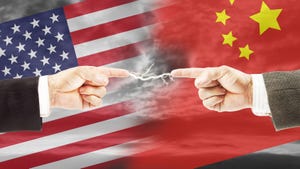CMA begins formal investigation into Vodafone and Three merger
The Competition and Markets Authority (CMA) has kicked off phase 1 of its investigation into Vodafone UK’s joint venture agreement with Three UK.
January 26, 2024

Having received the required pre-notification evidence and information from Vodafone UK and Three UK, as well as early views from stakeholders, the CMA has formally put its investigation hat on. The probe will examine what impact the deal, which would combine the operators under one single network, could have on competition for consumers and businesses.
This phase 1 investigation gives the CMA up to 40 working days to assess the deal, and will be looking at whether it may lead to a ‘substantial lessening of competition’ and if so whether a more in-depth second phase is required.
“This deal would bring together two of the major players in the UK telecommunications market, which is critical to millions of everyday customers, businesses and the wider economy,” said Sarah Cardell, Chief Executive of the CMA. “The CMA will assess how this tie-up between rival networks could impact competition before deciding next steps. We now have 40 working days to complete this formal Phase 1 investigation, before publishing our findings and any next steps.”
After months of rumours, Three and Vodafone announced their plans to merge operations in June last year. Seemingly in acknowledgement of the regulatory hurdles that will have to be vaulted to get it all signed and sealed, both firms immediately began explaining how good the move would be not just for them, but for the entire UK telecoms scene, and have done so at any opportunity that presents itself since.
In unison with this announcement, Vodafone and Three put out their own statements reiterating this position.
“By combining networks, Three UK and Vodafone UK will unlock £11 billion of investment that will help the UK close the 5G gap with leading European countries and realise its ambitions to be a front-runner in digital connectivity,” said Robert Finnegan, CEO of Three UK. “Thanks to this transaction, 95% of the population and every school and hospital will be covered by standalone 5G by the end of the decade. Joining forces will also yield more immediate benefits.
“From Day One, our customers will enjoy faster, more reliable coverage over more of the country – and without paying a penny extra. We are confident that this transaction will deliver significant benefits to our customers, the country and competition, and we look forward to working closely with the CMA as they review our notification.”
Ahmed Essam, CEO of Vodafone UK added: “We have formally submitted our Merger Notice to the CMA, having worked with them closely through the pre-notification process. We look forward to continuing the constructive conversations now that the formal process has begun.
“We strongly believe that the proposed merger of Vodafone and Three will significantly enhance competition by creating a combined business with more resources to invest in infrastructure to better compete with the two larger converged players. Our commitment to invest £11 billion will build capacity to meet the exponential growth in demand for data and accelerate the roll out of Advanced 5G across the UK, delivering benefits to consumers and businesses throughout the nation.”
The announcement from the CMA today insists that this assessment is strictly on the grounds competition, and It cannot consider other aspects like access to personal data and national security concerns, which it says are a matter for the UK government, ‘which may choose to intervene under the National Security and Investment Act if it finds concerns.’
Speaking of which, government issued a warning this week that a stake of Vodafone held by UAE based telco group e& is a security concern, and ordered the companies to take steps to alleviate these worries. The statement reads:
The Secretary of State considers that a risk to national security will arise in relation to Vodafone Group Plc’s role in:
a. supporting the UK Government’s domestic and international initiatives in the telecommunications sector;
b. contributing toward ensuring UK cyber security;
c. acting as a strategic supplier of services to many parts of the UK’s central government, including services provided to UK Government departments which are in support of national security.
It’s not exactly related to the merger, but whether this ends up producing a fly in the ointment for the process remains to be seen.
About the Author(s)
You May Also Like











_1.jpg?width=300&auto=webp&quality=80&disable=upscale)


.png?width=800&auto=webp&quality=80&disable=upscale)